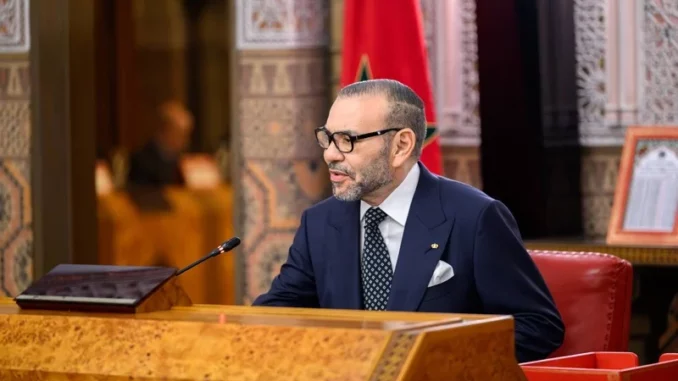
King Mohammed VI has deplored the tragic situation in the Palestinian territories, called for the immediate cessation of military operations and a return to the negotiating table, and announced the reopening of Morocco’s embassy in Damascus.
In an address to the 34th Arab League Summit that opened proceeding in Baghdad this Saturday, the King pointed out that the Palestinians are the victims of gross violations of international law, international humanitarian law, and all human rights principles and that following the collapse of the ceasefire agreement in the Gaza Strip, the situation in the region is alarming, requiring the revival of the truce agreement as a prelude to declaring a final ceasefire.
The King who called for an immediate cessation of military operations and a return to the negotiating table, stressed the urgent need for an intervention to put an end to the Israeli military aggressions in the West Bank, especially the demolition of houses and the forced displacement of unarmed Palestinians from the areas under Israeli control. He also called for ensuring the continued provision of humanitarian aid to the Gaza Strip and the West Bank, particularly medical and food supplies, and making sure that the supply of aid is not hindered for any reason.
In this vein, the Monarch underlined the need to maintain the role of the United Nations Relief and Works Agency for Palestine Refugees (UNRWA) and to support the Agency so that it may carry out the tasks assigned to it by the international community for the benefit of the civilian population.
The king insisted on the need to draw a comprehensive roadmap for the implementation of the reconstruction plan approved by the recent extraordinary Arab Summit in Cairo, without the displacement of residents. The reconstruction plan needs to be managed by the Palestinian Authority under Arab and international supervision, he said.
The Monarch who recalled the immutable principles underpinning Morocco’s foreign policy and historical responsibility towards the Palestinian cause, underlined the need to open up prospects for a political solution in order to bring about a genuine and just peace to the region, which guarantees the Palestinian people the achievement of their legitimate rights and the establishment of an independent Palestinian State on the June 1967 borders, with East Jerusalem as its capital and the Gaza Strip as an integral part of this state.
In his address, the Monarch also urged to grant adequate support to the Palestinian Authority, and stressed the need for Palestinian national reconciliation, which remains the fundamental gateway to strengthening the Palestinian position in any future peace process.
In keeping with the responsibility entrusted to him as Chairman of the al-Quds Committee, the King vowed to continue defending the holy sites, especially al-Quds al-Sharif, by building on the combined effect of political and diplomatic action, on the one hand, and the field work carried out by Bayt Mal al-Quds Agency, on the other.
“We shall continue to implement tangible programs and projects aimed at preserving the cultural and spiritual identity of the Holy City, improve the social and living conditions of the inhabitants of al-Quds, and support their steadfastness and continued presence in al-Quds,” King Mohammed VI pointed out.
In the address that was read out on his behalf by Minister of Foreign Affairs Nasser Bourita, King Mohammed VI also announced the reopening of Morocco’s embassy in Damascus, more than a decade after it was closed in 2012 following the flare up of the Syrian civil war.
The Monarch described the move as a reaffirmation of Morocco’s support for the promising course of action in the country and steadfast backing for Syria’s territorial integrity and national sovereignty, as well as a gesture of solidarity with the aspirations of the Syrian people for freedom, security, and stability.
“This initiative reflects Morocco’s commitment to supporting the Syrian political process and to opening new horizons for strengthening historic bilateral ties between Rabat and Damascus,” the King stated. He emphasized that the renewed diplomatic engagement would serve the mutual interests of both nations and reinforce Arab solidarity at a time of regional upheaval.
Morocco’s decision comes amid broader calls across the Arab world for reintegrating Syria into regional diplomacy and rebuilding fractured relations after years of conflict and isolation.
In his message, the Monarch touched on what he called “the painful and unfortunate circumstances some Arab sister nations are experiencing,” pointing out that “Morocco has not spared – nor will it spare – any effort to heal rifts and contribute to finding solutions to the crises plaguing our Arab region, making dialogue and peaceful initiatives prevail over the logic of force and military solutions.”
In this regard, he referred, in particular, to the crisis affecting Libya, recalling that since the beginning of the crisis, the Kingdom has been resolutely and effectively engaged in regional and international efforts aimed at reconciling political rivals and facilitating their efforts to find a solution to the crisis.
Morocco is also following with deep concern the dangerous developments unfolding in some Arab countries, such as Yemen, the Sudan, and Lebanon, said the King, who reaffirmed Morocco’s commitment and support for all initiatives and efforts aimed at promoting a political process that is conducive to stability and peace in these Arab countries, and that can help overcome differences and conflicts through peaceful and diplomatic means, while safeguarding the national sovereignty and territorial integrity of Arab sisterly nations.
King Mohammed VI reiterated Morocco’s readiness to engage in any dynamic that promotes joint Arab action and contributes to fulfilling Arab peoples’ aspirations for greater security, stability, progress, and prosperity.
